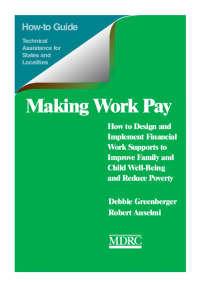Making Work Pay
How to Design and Implement Financial Work Supports
The passage, in 1996, of the federal Personal Responsibility and Work Opportunity Reconciliation Act gave states latitude to make substantial changes in their welfare policies. The time limits and stricter work requirements that states imposed have received the greatest public attention, but the vast majority of states have also used their new freedom to change their “earnings disregard” policies, which allow welfare recipients to earn more even as they remain on the rolls. These changes have been designed to provide additional financial incentives to encourage work and to increase income for families in which the parent does work. Recent research has found strong support for the earnings supplements: The additional income not only encourages work; it also helps young children perform better in school.
States have increased welfare recipients’ financial incentives to work in a variety of ways. Some allow welfare recipients to keep their entire welfare check while they remain on welfare, although most provide less generous incentives for shorter periods of time. Some states have introduced financial incentives outside the welfare system, through such policies as Earned Income Tax Credits, to avoid having recipients approach time limits faster by combining work and welfare. Some have introduced bonuses for welfare recipients who remain employed for a specified period of time. This guide summarizes the research evidence that supports the use of financial incentives, and it offers advice on the form financial incentives might take and how generous they might be made.
The information in this guide may be more important now than ever. When Congress reauthorizes the nation’s welfare policy in 2003, it is likely to require even more recipients to work and require them to work more hours per week. The use of the policies described in this guide can help states meet the new goals as well as reduce poverty and benefit children. Although most states are suffering severe budget shortfalls as this guide is published, Making Work Pay discusses ways to make earning supplements more efficient and less costly. As the economy rebounds in the coming months and years — and state budgets recover accordingly — the guide will remain a useful resource for those who are thinking about how to use new funds to help families.






